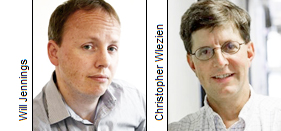In the UK, claims of a crisis in the accuracy of election polling are false, according to a new study led by the University of Southampton. More generally, the study found that there is no evidence to suggest that poll errors have increased over time. Following the UK's 2015 General Election, pollsters were blamed for having systematically over-represented Labour supporters and under-represented Conservative supporters in their samples, in an inquiry led by the BPC / MRS. At the time, the BPC (British Polling Council) and the MRS (Market Research Society) declared the 2015 polls were 'some of the most inaccurate' since election polling first began in the UK in 1945. Following two further polling 'misreads' - the 2016 'Brexit' vote to leave the EU and the US Presidential election - Kantar published some research which found that pollsters had predicted the correct outcome of every major national election held last year.
Following the UK's 2015 General Election, pollsters were blamed for having systematically over-represented Labour supporters and under-represented Conservative supporters in their samples, in an inquiry led by the BPC / MRS. At the time, the BPC (British Polling Council) and the MRS (Market Research Society) declared the 2015 polls were 'some of the most inaccurate' since election polling first began in the UK in 1945. Following two further polling 'misreads' - the 2016 'Brexit' vote to leave the EU and the US Presidential election - Kantar published some research which found that pollsters had predicted the correct outcome of every major national election held last year.
The latest research, led by Professor Will Jennings at the University of Southampton and Professor Christopher Wlezien from the University of Texas at Austin, focused on more than 300,000 national polls from 351 general elections in 45 countries during the period from 1942 to 2017. Their paper, titled 'Election polling errors across time and space', confirmed that the average absolute error of pre-election polls has fluctuated over the years but has not increased. When polling was first introduced during the 1940s and 1950s, the mean error was 2.1 per cent. This average was also consistent during the 1960s and 1970s and has been two per cent since 2000. Additionally, in countries where there is regular pre-election polling over a period of almost forty years, the pair found that the evidence is that polls have become more accurate, not less.
Their report showed that there is no significant trend of increasing polling inaccuracy in recent times, which the authors say implies that declining response rates and the growing variation in survey mode, sampling, and weighting protocols together have had little effect on the performance of pre-election polls, at least when taken together. Professor Jennings comments: 'It is understandable that people tend to focus on high profile polling misses, and shock election results, but the evidence dispels the claim that polling is any more inaccurate that at any point in history. Of course, polling is a tricky business and has to adapt to changes in politics and wider society - and will inevitably go wrong from time to time. But it is important not to rush to judgment and generalise from individual cases. Our study shows the importance of testing polling accuracy over the long-term and in cross-national perspective'.
Web site: www.southampton.ac.uk .
All articles 2006-23 written and edited by Mel Crowther and/or Nick Thomas, 2024- by Nick Thomas, unless otherwise stated.
Register (free) for Daily Research News
REGISTER FOR NEWS EMAILS
To receive (free) news headlines by email, please register online